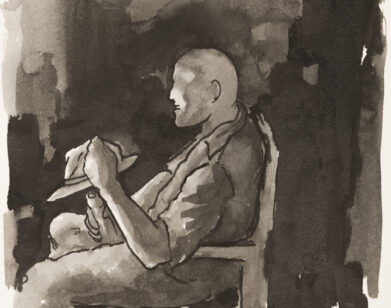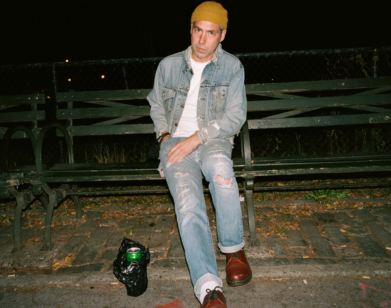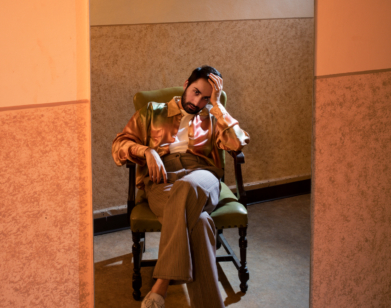LIT
Nora Treatbaby Can Make Your Poetry Readings a Little Less Boring
Near the end of 2021, I gave a deliberately (and possibly inadvisably) provocative reading. I opened it with a sort of content warning, noting that if anything in the piece “strikes you a certain way” you were welcome to come talk to me about it afterwards. Nora Treatbaby, who then had recently moved to New York, was the only person who took me up on this proposition, approaching me after the reading and politely offering to discuss the piece I’d read.
Fearlessness on approach is what makes Nora’s own poems sear. Her multivalent boldness—a hallmark of her new book, Our Air—makes her a particular voice in this generation of poets; she is playful without trivializing her distress, political without being rigid or reactionary, queer without being obvious, and endlessly thoughtful without getting lost in intellectual jargon or posturing. She knows where she stands – or she isn’t sure but she’s going to make you laugh about it. You might run into her in the city, where she is equally likely to be at a protest, a reading, or a crowded house party, late at night, talking vividly about something that happened to her that day.
It is rare when what’s enjoyable about someone’s writing also comes through in spending time with her. The path Nora has worn through the world, marked by unusual, lyrical, and painful confrontations, arrives in the poems as clearly as it does in casual conversation. In a broader culture that fawns over naïveté, Nora has the wisdom and playful irony of an elder. Earlier this month, while both of us were passing through a Midwestern state where trans healthcare is all but banned, we met up at a coffee shop to talk genre-bending, humor-as-cope, and liberatory politics.
———
HANNAH BAER: I keep thinking about the first time I heard you read in Prospect Park in the Veil of Cashmere, where you read a version of the “After the Waterfall” poem. Usually when I’m at a poetry reading, I’m in the back looking at my phone, which is what I was doing. And then when you started reading that poem, I was like, “Oh, fuck.” There was something about that poem that called me to presence in a way that I think is unusual in my experience of hearing poetry. It’s kind of just stunning, formally and also as an invitation or something. And I wanted to just invite you to speak about it.
NORA TREATBABY: I definitely wrote that poem for poetry readings with the knowledge that readings are boring. I was like, “I need to create a form that cuts through.” Why would the recitation of something written for the page not be boring? And the attention economy being what it is, I was like, “I can’t even really expect people to honor my art with their attention when I myself can’t focus at these things.” So that work is highly vulnerable, and I think it’s about forgiveness, primarily. I was seeking to understand myself after making this series of life-altering and kind of life-destroying mistakes. And I wanted to overcome a dilemma that I just felt inside of myself, which was a deep amount of shame. I didn’t necessarily have answers. I was just, quite frankly, really miserable. And I had to figure out a way to understand myself as I had never understood myself before, which was with a lot of complexity.
BAER: Yeah, completely. I feel like, in that poem, the thing that’s so painful to hold, or glitchy, isn’t something you buy at a convenience store. It’s actually the remnants of your own experience.
TREATBABY: Yeah. I mean, the thing that happened was I went to a waterfall with a friend when I was deeply miserable and we had a conversation that was moving. Later that day, I gave a guy a ride to Burger King because it was raining and he was walking down the road. Not to demystify this, but maybe it’s worth it. I don’t know if I’ve ever even said all this loud. Anyway, I went home and did a ton of ketamine and wept. But so much a part of that was, “Okay, we’re moving through this capitalist hellscape trying to salvage meaning, or understand that meaning is still all around us.”
BAER: There’s a sacredness, even in the bright light of the Burger King sign.
TREATBABY: Yeah. But also, that occurred the same day I hiked to a waterfall, whose sacredness is obvious and protected and reified by our entire society.
BAER: Totally. Can I ask one more biographical question related to the poem? I loved your explanation of what actually happened. But there’s one other part in it, which is that there’s a phone call and something about the phone call is really important, I think, in the arc of the waterfall, giving a guy a ride, ketamine.
TREATBABY: Yeah. I mean, I was on ketamine when I made the phone call. But in your project, in different ways, I feel like you’ve articulated that the rave or being high in and of itself, or being high with people in a particular type of way, salvages a collectivity or dissolves an individuation.
BAER: Well, I think that idea is part of what it does. It collapses this kind of sacred-profane boundary, like the Burger King and the waterfall, and then you just have to look at everything as having the possibility of an opening in it.
TREATBABY: Yeah, totally. I think a part of the waterfall poem is that I saw two weird people hug, it’s noticing instances in which reality broke through my normal cynical response to things. Or maybe not reality breaking through, but reality was somehow articulating something that broke through my expectation, that what we are experiencing is sad.
BAER: There’s something in that idea that connects to a sense of how to define what’s political and the possibility of having politics, and a depoliticized and also kind of hopeless-feeling world.
TREATBABY: Yeah. I was at this Maoist film screening the other day, which isn’t really my thing, but it was interesting. The one thing somebody said was like, “Oh, in capitalism, our identities are inscribed by the choices we make as consumers. And we would rather inscribe ourselves as revolutionaries through these ways,” or whatever. It did kind of make me wrestle with this idea that a lot of the ways we think about who we are are naturalized through the system or the state. Having a politics inside of that could or could not have to do with what is possible, if that makes sense. It could still be utopic or idealistic or, more in the case of my book, feature the words that are often derided as corny, like “love” or “hope.”
BAER: What you pull off in the book is approaching the world with this kind of extreme sentimentality that nonetheless is quite serious and quite tolerant of irony and cynicism. You’re like, “I don’t need to be unironic in order to also be sentimental and deeply emotionally present.”
TREATBABY: I feel like those things are inherently interwoven. This is an obvious take, but humor helps us cope. We make jokes about things that confuse us or exhaust us. The joke actually occurs at the limit of our exasperation. I don’t know why it wouldn’t be blended with sincerity or hope or despair.
BAER: Absolutely. That makes me think of something else about the book that’s really particular, which is the way you talk about the body and about having a transfeminine body, the way some parts of that are intrinsically challenging, but you figure out how to lay within that.
TREATBABY: I mean, I feel like transness is inherently ridiculous, or it’s pretty funny. I also think we have to be able to laugh at it because, with transness, for understandable reasons, we’re sometimes afraid to talk about it because there’s a fascist or terf-y element in our society that’s setting the boundaries for us. I have a very transphobic father. But then I also have a mom who’s very supportive, but is challenged by parts of it. I feel like that’s a lot of our parents. I want us to be able to incorporate a broader sphere of discourse that’s not set by the terms of the attack on us. And so for me, transness is laughable. My balls do fall out of my panties, I am a failure of a woman as much as I’m the most beautiful one on earth. Those things are simultaneous and it’s not helpful for me to not include all of that.
BAER: Last summer I got a chance to go to the UK and meet a lot of trans women in that country. Watching people cope with that reality, I was struck by how complex their ways of coping are. I expected people to be reactive and victimized. They were all kind of like, “Yeah, it’s pretty crazy. It’s kind of twisted.” They had that deep sense of humor about it, a sense of humor that was mocking, in a way. But not just mocking the adversary, but mocking the entire situation. It’s like, “We’re in a peculiar situation.” And I think that’s something I appreciate about the way in which I experienced your writing as really political without being prescriptive or preachy. You’re like, “I just happened to have this twisted experience.”
TREATBABY: Right. I just had that thought that day. As an artist, I am always seeking balance. So if I am going to say something that’s expansive and, in my opinion, very profound, it almost requires that I undermine it. By, again, remarking on how stupid I can be also, or thinking about the stupid situation that we’re in that even would produce profundity, that’s the same thing as working that tension with sincerity and humor, or sincerity and politics, to get to a place where one particular style of speaking about something doesn’t prevail.
BAER: When you’re writing, do you think about the reader as part of your process?
TREATBABY: I’d say I’m a pretty self-conscious writer. I feel that I want to say something truthful to myself. But I do have to be aware that the reader is precise and is bringing their own opinions and beliefs into it, ones I probably can’t do that much to change. But I’m also a poet, which means I’m not necessarily making an argument. I wonder, when you’re writing essays, if you are doing it to tie a knot for yourself or to argue something?
BAER: I’ve gotten to this place of late where there’s a little more of a grab-bag vibe about it, which I think also is connected to being exposed to more poets who are my contemporaries who I admire, including you. I’m like, “It’s not actually in my control what other people experience in my work.” I don’t get to decide how it lands with the person who’s hearing it exactly. I tend to think that my work is stronger when I’m thinking about the audience somewhat.
TREATBABY: Have you read Close to the Knives?
BAER: Yeah.
TREATBABY: I read that last week and I feel like his writing does a lot of things at once, in that it’s prose that veers off into soliloquy that’s also pretty poetic. And then it also does kind of pretty, imprecise rambling. I was reading it and I was like, “It’s weird how refreshing this is to read because I feel so excited by the lack of genre in this.” To some degree, it’s a memoir, for sure, but I also could release myself from that expectation for a lot of it. I also think that David [Wojnarowicz] was really writing that self-consciously for the audience. It’s not a journal.
BAER: Totally. I think that about a lot of writing that I admire. If it comes up to meet you close enough where it relates to you, and then it also pulls you through all these different kinds of discursive mode, whether it’s a list or an image or something really abstract, it carries you from the place you started into a different place.




